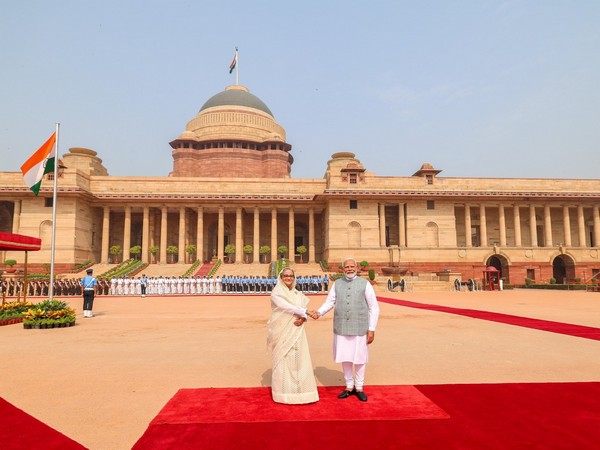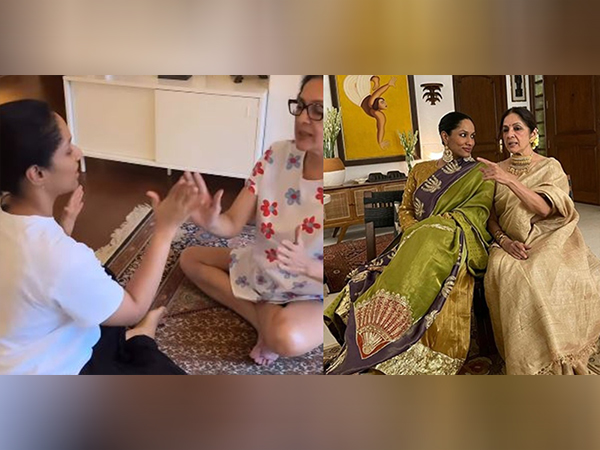New Delhi [India], June 22 (ANI): Prime Minister Narendra Modi and his Bangladesh counterpart Sheikh Hasina on Saturday articulated their shared vision for peace, prosperity and development of the two neighbours and the entire region driven by connectivity, commerce and collaboration.
Significant agreements encompassing connectivity, commerce and power sector were signed during the visit of PM Sheikh Hasina to India.
PM Modi had “very substantive and purposeful” discussions with his Bangladesh counterpart during their bilateral meeting on Saturday.
The two countries agreed to start a new train service between Rajshahi and Kolkata, a new bus service between Chittagong and Kolkata and commencement of goods train services between Gede-Darsana and Haldibari-Chilahati up to Dalgaon.
They agreed to the construction of the Inland Container Depot (ICD) at Sirajganj under grant assistance and the commencement of export of 40 MW of power from Nepal to Bangladesh through Indian grid.
The two leaders agreed for a Joint Technical Committee for discussions on the renewal of the Ganga Water Treaty and a technical delegation will visit Bangladesh for the project on the conservation and management of the Teesta River inside the neighbouring country.
There will be 350 training slots for Bangladeshi police officers and Muktijoddha Scheme for medical patients will have an upper ceiling of Rs 8 lakh per patient. Bangladesh joined the Indo-Pacific Oceans Initiative.
A commercial agreement was signed between NPCI and Bangladesh Bank for the launch of UPI.
In their wide-ranging discussions, PM Modi and Sheikh Hasina recognized that the India-Bangladesh partnership, which is founded on deep historical, linguistic, cultural, and economic linkages has strengthened in the last decade inspired by the spirit of their shared sacrifices of 1971 and guided by their new aspirations of the 21st century.
To realize the immense potential of this extra-ordinary relationship and to turn it into a transformational partnership for mutual benefit and prosperity of their people and the entire region, the two leaders jointly articulated Shared Vision for peace, prosperity and development of the two neighbours and the entire region, driven by connectivity, commerce and collaboration:
The shared vision document said that ties reflect of an all-encompassing partnership that transcends a strategic partnership, built upon shared values and interests, equality, trust and understanding and rooted in mutual sensitivity to each other’s aspirations and concerns.
“Together, we will pursue a transformative partnership that advances the shared interests in promoting multi-faceted connectivity for both our countries as well as the entire region by transforming our geographical proximity into new economic opportunities. This will include connectivity in its broadest form – physical connectivity covering multi-modal transport and cross-border trade & transit infrastructure for seamless cross-border movement of people, goods and services, as well as energy connectivity and digital connectivity. As part of our sub-regional connectivity initiatives, India will extend transit facilities for movement of Bangladesh goods to Nepal and Bhutan through railway network,” the document said.
“We are committed to early operationalization of the BBIN Motor Vehicle Agreement to promote sub-regional connectivity. In this context, we welcome a new MOU on Railway Connectivity as well as the decision to commence goods-train service from Gede-Darshana through Chilahati-Haldibari up to Hasimara via Dalgaon railhead (as and when operationalized) at the India-Bhutan border,” it added.
The document said the two countries will continue to expand power and energy collaboration and together develop intra-regional electricity trade, including of competitively-priced power generated from clean energy projects in India, Nepal and Bhutan, through the Indian electricity grid.
“To this end, we will expedite the construction of 765 kV high-capacity interconnection between Katihar-Parbatipur-Bornagar with suitable Indian financial assistance, to act as the anchor for our grid connectivity,” the document said.
Underlining the pivotal role played by emerging technologies to build inclusive, sustainable and digitally empowered societies and to bring larger benefits to people of both countries, the leaders agreed to forging a new paradigm for future-oriented partnership through a “Shared Vision for India-Bangladesh Digital Partnership” and “Shared Vision for India-Bangladesh Green Partnership for a Sustainable Future” in line with respective broader Vision of “Viksit Bharat 2047” and “Smart Bangladesh Vision 2041”.
“These will build a transformative collaboration between India and Bangladesh by leveraging green and digital technologies to foster economic growth, sustainable and climate-resilient development, environmental conservation, cross-border digital interchange and regional prosperity,” the document said.
“We will also pursue collaboration in frontier technologies, including civil nuclear, oceanography and space technology. To this end, we will partner in joint development of a small satellite for Bangladesh and its launch using Indian launch vehicle,” it added.
The two leaders agreed to strengthen trade and investment linkages including through early commencement of negotiations for a Comprehensive Economic Partnership Agreement (CEPA), early operationalization of two Special Economic Zones (SEZs) offered by Bangladesh to India in Mongla and Mirsharai, opening of new border-haats, trade facilitation to enhance bilateral trade, improving road, rail, air, and maritime connectivity and trade infrastructure which can transform the geographical proximity into new economic opportunities for our peoples.
“We will also encourage and support our private sector to seek new investment opportunities in each other’s priority areas of economic development,” it said.
Recognizing the importance of water resource management in bilateral relationship, India and Bangladesh agreed to continue to engage in prioritizing the exchange of data and formulating the framework for interim water sharing based on the recommendations of the Joint Rivers Commission.
“We welcome the formation of a Joint Technical Committee to initiate discussions for the renewal of the Ganges Water Sharing Treaty of 1996. As part of our development cooperation, we will also undertake conservation and management of Teesta River inside Bangladesh with Indian assistance within a mutually agreed timeframe,” the document said.
India and Bangladesh agreed to strengthen defence cooperation with a long-term perspective.
“In line with the plans for modernization of the Bangladesh Armed Forces, we will explore defence industrial cooperation for modernization of the Armed Forces of Bangladesh, to strengthen their capability for defence. We will continue to work closely with Bangladesh for our multifaceted military engagements of exercises, training and capability development,” the statement said..
“We will further bolster India-Bangladesh development cooperation by concluding a new Framework Agreement for Development Partnership, which will expand the reach of our projects and programmes in line with the priorities of the people and the Government of Bangladesh and our long-term vision of closer connectivity. We will work together to expand our capacity building programme for civil services, judicial officers, police and other specialized services of Bangladesh,” it added.
The two countries signed 10 Memorandum of Understandings (MoUs) or vision documents and made several announcements.
PM Sheikh Hasina is the first leader on state visit to India after the formation of the Modi 3.0 government. She is in India on a two-day visit. The Bangladesh leader had come to Delhi to take part in the swearing-in ceremony of PM Modi.
Foreign Secretary Vinay Mohan Kwatra told a media briefing that the visit, the discussions, the substance of the outcome between the two leaders “has been very, very substantive and purposeful”. (ANI)
Disclaimer: This story is auto-generated from a syndicated feed of ANI; only the image & headline may have been reworked by News Services Division of World News Network Inc Ltd and Palghar News and Pune News and World News
HINDI, MARATHI, GUJARATI, TAMIL, TELUGU, BENGALI, KANNADA, ORIYA, PUNJABI, URDU, MALAYALAM
For more details and packages
















